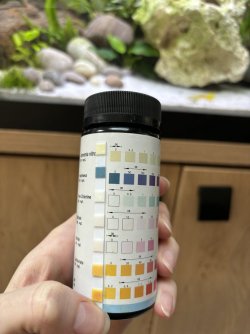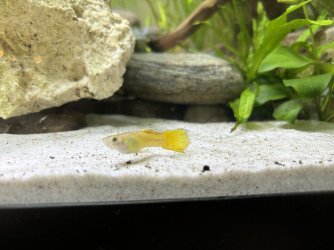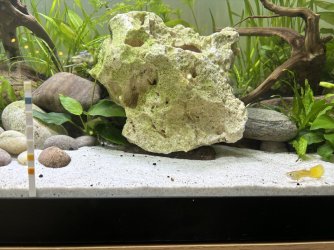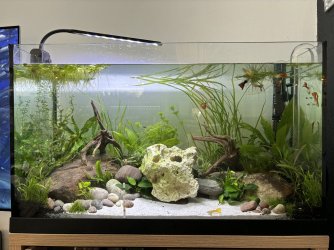It's unlikely to be the hardness, if it was then most or all of the fish would have issues. Same reason it's not a water quality issue.
When a fish sits on the bottom breathing heavily and not eating, it's usually a bad sign and the fish is near death. You can try adding salt and hope it's not an internal organ failure scenario, but more often than not, when it happens suddenly (fish is fine one day and gasping/ breathing heavily the next), it's usually a major internal issue.
If the fish's poop is looking normal coloured and the fish hasn't bloated (gotten really fat) overnight, you can try adding salt (see directions below), but there's a good chance the fish will be dead tomorrow.
-------------------
SALT
You can add rock salt (often sold as aquarium salt), swimming pool salt, or any non iodised salt (sodium chloride) to the aquarium at the dose rate of 1 heaped tablespoon per 20 litres (5 gallons) of water. If there is no improvement after 48 hours you can double that dose rate so there is 2 heaped tablespoons of salt per 20 litres.
If you only have livebearers (guppies, platies, swordtails, mollies), goldfish or rainbowfish in the tank you can double that dose rate, so you would add 2 heaped tablespoons per 20 litres and if there is no improvement after 48 hours, then increase it so there is a total of 4 heaped tablespoons of salt per 20 litres.
Keep the salt level like this for at least 2 weeks but no longer than 4 weeks otherwise kidney damage can occur. Kidney damage is more likely to occur in fish from soft water (tetras, Corydoras, angelfish, Bettas & gouramis, loaches) that are exposed to high levels of salt for an extended period of time, and is not an issue with livebearers, rainbowfish or other salt tolerant species.
The salt will not affect the beneficial filter bacteria but the higher dose rate (4 heaped tablespoons per 20 litres) will affect some plants and some snails. The lower dose rate (1-2 heaped tablespoons per 20 litres) will not affect fish, plants, shrimp or snails.
After you use salt and the fish have recovered, you do a 10% water change each day for a week using only fresh water that has been dechlorinated. Then do a 20% water change each day for a week. Then you can do bigger water changes after that. This dilutes the salt out of the tank slowly so it doesn't harm the fish.
If you do water changes while using salt, you need to treat the new water with salt before adding it to the tank. This will keep the salt level stable in the tank and minimise stress on the fish.
When you first add salt, add the salt to a small bucket of tank water and dissolve the salt. Then slowly pour the salt water into the tank near the filter outlet. Add the salt over a couple of minutes.





